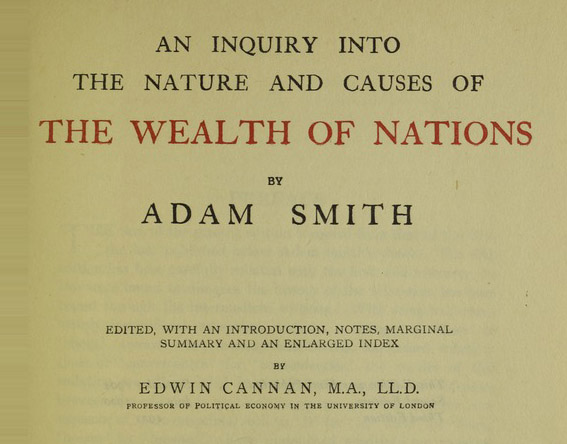
Continuing my dive into Capitalism, I headed to the beginning, to An Inquiry into the Nature and Causes of the Wealth of Nations, better known simply as Adam Smith’s masterpiece The Wealth of Nations.
This is one of those books you hear about so often you think already know, but which you really only know of until you crack it open and dig into the details. And wow, are there ever details. Depending on the size of the reprint, it’s between 750 and 1200 pages in total. Originally published as five separate books, so even if you think you’ve read the book, you may have never made it past Book II.
The gist? Mercantilism is wrong, that the wealth of a nation shouldn’t be measuring in the amount of gold and silver it has in the treasury, but rather the true wealth of a nation is how much the country produces. In modern terms, it’s GDP.
The rest of the details are Smith’s recipe for maximizing production. Given this is the first formal book on Economics, it takes Smith hundreds of pages to describe that recipe. The inner workings of capital, labor, trade, tariffs, taxes, colonies, corporations, and government are spelled out in minutia upon minutia, down to the pound, shilling, and pence.
The level of detail is astounding, with examples not only from Scotland and England and France, but also the British Colonies, Indostan (India), China, Persia, and even at times back into the Roman Empire. There was no bibliography in my version of the text, no footnotes in the text, and no amount of googling explained how Smith gathered all that data. Between the length of the text and the level of detail it is quite understandable how these books took nine years to write.
Yes, there is an invisible hand mentioned, but all of three times. Yes, there is an argument for low tariffs and reasonably low taxes. The libertarian, Laissez-faire beliefs underlie the arguments, but Smith spends far more pages talking about how many shillings and pence are in the tariffs for wheat, the percentage rate of tax on land and homes and people, the amount of debt year by year in the Bank of England, the cost of each English war, and so on at a mind numbing level of detail.
In that way, Capital in the 21st Century is an homage to The Wealth of Nations. If only Smith had a spreadsheet, his book too would be full of tables and graphs, rather than dozens of pages of prose drawing those graphs in the minds of readers.
In terms of answering my questions on income inequality, Smith was not of much help. Smith lays down the groundwork dividing capital and labor which Marx picks up 72 years later in his books. Smith briefly (40 or 50 pages) describes corporations, but they were too new and too few in the 1770’s to be important to his ideas.
In short, I’m very glad to have read the book, but it leaves me with more questions than answers. If the father of Capitalism doesn’t have those answers, perhaps its biggest enemy will. Next up, the Manifesto of the Communist Party.















Enjoyed your write-up. Sharing a few thoughts on existing inequality and solutions thereof. Great and persistent inequality in the midst of plenty is a paradox of our times – it contradicts the most fundamental principles of social justice. It appears that our emphasis on free market as the solution to improving human quality of life does not work. The economics’ leadership too is voicing discontent over the “profession going off course” by, for instance ignoring real world behavior for models based on people as rational optimizers and exaggerating the benefits generated by the financial industry. The Economist too now admits that while it (free market) “has come to a juddering halt” no plausible alternatives of political and economic organization are in sight.
Prof Stiglitz has been writing/ speaking a lot on inequality and certainly suggest concrete policy options for the same. Also other leading thinkers including Robert Putnam postulate that more unequal societies, where levels of trust and social cohesion are low, are less likely to invest in public goods and infrastructure – such as conserving the environment, public health, or improving education system – even though such investments are critical for the well-being of current and future generations.
Evidence suggests that privileged folks have enjoyed outsize influence over economic policies in recent decades – not surprisingly a growing share of wealth has landed with people who need tax free havens to store their wealth, while poor and middle-class households have seen their earnings stagnate and decline.
From a recent NYT article referring to recent Davos meeting, Prof Stiglitz said – “The stark reality is that globalization has reduced the bargaining power of workers, and corporations have taken advantage of it.” Yet the solutions seem calculated to spare corporations and the wealthiest people from having to make any sacrifices at all, as if there is a way to be found to tilt the balance of inequality while those at the top hang on to everything they have. More entrepreneurialism, mindfulness training, education focused on the modern ways of technology: These are the sorts of items that tend to get discussed here as the response to the plight of those left behind by globalization. That perhaps private equity overseers should not be paid 1,000 times as much as teachers while availing themselves of tax breaks is thinking that gets little airing here.
I disagree with your premise:
“Great and persistent inequality in the midst of plenty is a paradox of our times – it contradicts the most fundamental principles of social justice.”
Where is it writ that social justice means everyone has the same? Does social justice decree that if the only way everyone can have the same is that they have hardly anything then that is better than everyone has quite a bit but a few have much more?
Maybe that is your social justice. It isn’t mine.
Mine if far more nuanced and leans a lot more toward what will give most people good living circumstances even if it means some end up so annoyingly wealthy that it elicits the green eyed monster in many of us.
Your point that the wealthy have far more influence on society than the poor seems certainly correct. However, many forms of governance of society have existed over time including ones that provided power based on wealth and/or family. Again, where is it written on stone tablets that one particular form of governance is the one blessed by the Divinity as the proper one?
We actually have a mode of government in this Country which allows the majority when aroused to fight back against the wealthy elite’s unholy influence. That we haven’t to your satisfaction is either a function of our stupidity or a sign that, on the whole, we as a group are reasonably satisfied with the current arrangement.
I would propose that many of the ills that you perceive are not the result of a free market but rather the result of a market distorted by the strictures and whims of a government influenced both by the powerful wealthy you allude to as well as social experimenters encouraged by academia to King Canute inexorable economic forces.
“I would propose that many of the ills that you perceive are not the
result of a free market but rather the result of a market distorted by
the strictures and whims of a government influenced both by the powerful
wealthy you allude to as well as social experimenters encouraged by
academia to King Canute inexorable economic forces”
Yes… and from the fundamental structure of Capitalism itself, which if uninfluenced by government leads to a small number of wealthy who then use that wealth to gather power.
“Where is it writ that social justice means everyone has the same?”
I’m a Capitalist, not a Socialist, and am in full agreement with you that social justice doesn’t mean that everyone has the same level of wealth. However, I started down this adventure in Capitalism after asking the bigger question, “What happens in a society when inequality grows?” Historically, the answer is revolution or war.
Maybe the current wave of populism will stem a repeat of that history for a while, or maybe its a harbinger. According to Picketty, the Great Depression and Word War I put off the question for the 20th Century, at least for Europe and the US. We were not taught about the details of Cultural Revolution in my public American schools. It totally fits that historic pattern.
So yes, it’s totally fine to have a growing group of billionaires and perhaps soon even a few trillionaires, but if at the same time half of the population has its kids not better off than their parents, then those rich elite had better use their power to make sure Hollywood doesn’t release any historic dramas that highlight Marx, Mao, or Robespierre.
Perhaps you can imagine an angry majority finding a way to beat the incumbent Congress reps one by one, despite the billionaires paying for campaigns, or for a true populist President sitting down and playing nicely with a Congress who themselves are rich elite even without the campaign contributions. I have a hard time picturing that future.
I actually meant to address Arun Kashyap’s comment not your original piece. I agree that all or least most of society has to see reasonably steady economic progress or there will be discontent potentially leading to violence or at least unproductive disruptions. I also agree that, absent some regulatory strictures, it is likely that those ambitious, smart, and ruthless enough to acquire great wealth will have a tendency to control the system in their favor and disadvantage others.
My point is a governance one. Any attempt by the government to move away from a free market is fraught with dangers, mainly the one that those gaming the system will move from the wealth advantaged to the politically advantaged and we’ll have the pigs in the farmhouse.
I specifically took exception to Kashyup’s reference to social justice. Historically great mischief has been done in the name fairness and the people.
Thanks for the pointer to Stiglitz. The NYT article and CNN interview show he’s thinking about the problem. I’ll add him to the reading list and hope he has some workable solutions, as the more I read, the more I find proposals no more useful than Picketty’s.